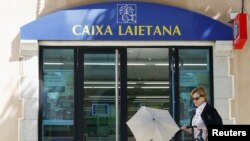Europe's governmental debt crisis is deepening, with Spain's borrowing costs reaching their highest point since the launch of the euro currency 13 years ago.
European governments agreed to a $125 billion bailout for Spanish banks over the weekend, but investors have shown little regard for the rescue package. The Fitch financial services firm downgraded the credit ratings for 18 of the country's banks and the interest rate on 10-year Spanish bonds neared 7 percent. That is the level at which Greece, Portugal and Ireland all were forced to seek international bailouts in the last two years.
Italy's borrowing costs also advanced sharply, moving above 6 percent.
Austrian Finance Minister Maria Fekter drew the ire of Italy by suggesting that Rome's "very high deficits and debt" may force it to seek a bailout. Italian Prime Minister Mario Monti called her comments "completely inappropriate."
Several financial analysts said the uncertainty of the terms of the Spanish bank bailout contributed to the increase in government borrowing costs. Analyst Daniel Alvarez at XTB Brokers also said there is the unpredictability of next Sunday's Greek parliamentary elections that amount to a referendum on whether Greece stays in the 17-nation eurozone or becomes the first country to leave it.
"First because we don't know the details of the [bailout] plan and it seems that in Europe everyone has a conflicting voice and there is an enormous lack of consensus which means we don't know the exact details," said Alvarez. "Second, undoubtedly the timing is also an important reason. It's true that it was urgent to take that measure [bailout], a measure which as far as we know continues to be positive, but the fact is that the rescue of the Spanish banking sector will be associated with the next element, the next important event in the markets which is none other than the Greek elections this weekend."
Alvarez said investors' fears are not just focused on Spain's precarious financial state, but rather on the eurozone as a whole.
"The attack is not on Spain, the attack is on Europe as a project and that is something we must all have clear, and proof of that is that the Italian MIB index was the one that fell most [Monday] - almost 3 percent on market closure - so it's clear the attack is on Europe,'' said Alvarez.
European governments agreed to a $125 billion bailout for Spanish banks over the weekend, but investors have shown little regard for the rescue package. The Fitch financial services firm downgraded the credit ratings for 18 of the country's banks and the interest rate on 10-year Spanish bonds neared 7 percent. That is the level at which Greece, Portugal and Ireland all were forced to seek international bailouts in the last two years.
Italy's borrowing costs also advanced sharply, moving above 6 percent.
Austrian Finance Minister Maria Fekter drew the ire of Italy by suggesting that Rome's "very high deficits and debt" may force it to seek a bailout. Italian Prime Minister Mario Monti called her comments "completely inappropriate."
Several financial analysts said the uncertainty of the terms of the Spanish bank bailout contributed to the increase in government borrowing costs. Analyst Daniel Alvarez at XTB Brokers also said there is the unpredictability of next Sunday's Greek parliamentary elections that amount to a referendum on whether Greece stays in the 17-nation eurozone or becomes the first country to leave it.
"First because we don't know the details of the [bailout] plan and it seems that in Europe everyone has a conflicting voice and there is an enormous lack of consensus which means we don't know the exact details," said Alvarez. "Second, undoubtedly the timing is also an important reason. It's true that it was urgent to take that measure [bailout], a measure which as far as we know continues to be positive, but the fact is that the rescue of the Spanish banking sector will be associated with the next element, the next important event in the markets which is none other than the Greek elections this weekend."
Alvarez said investors' fears are not just focused on Spain's precarious financial state, but rather on the eurozone as a whole.
"The attack is not on Spain, the attack is on Europe as a project and that is something we must all have clear, and proof of that is that the Italian MIB index was the one that fell most [Monday] - almost 3 percent on market closure - so it's clear the attack is on Europe,'' said Alvarez.
Some information for this report was provided by AP, AFP and Reuters.





